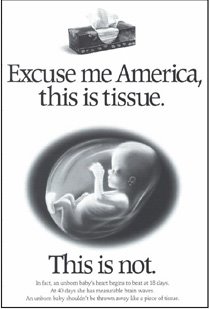Feminists for Life Makes Strong Case In Letter To Amnesty International
 Jessica O'Connor-Petts, Board Chair of Feminists for Life pens a letter to Amnesty International, requesting they reconsider their revised position on abortion. Serrin M. Foster, President, Feminists for Life is urging all members and supporters to likewise send a letter to Amnesty International.
Jessica O'Connor-Petts, Board Chair of Feminists for Life pens a letter to Amnesty International, requesting they reconsider their revised position on abortion. Serrin M. Foster, President, Feminists for Life is urging all members and supporters to likewise send a letter to Amnesty International.Remember that on August 11, 2007 Amnesty meets in Mexico City.
This is a very well written letter built upon good rationale and arguments. Will Amnesty International begin to listen to logic and common sense before they pave the way for the violent deaths of countless more Unborns?
**********
Mr. Larry Cox
Executive Director
Amnesty International
5
Cc: Ms. Karen Schneider
Chair, Sexual and Reproductive Rights Working Group
Amnesty International USA
Dear Mr. Cox:
Feminists for Life of
However, we differ with Amnesty’s call upon all nations to ensure access to abortion for any woman who becomes pregnant as a result of rape, sexual assault, or incest, and would strongly urge you to consider the concerns and perspectives expressed in this and subsequent paragraphs. FFL supports the protection of women from abortion, which is itself a form of violence against women, and for this reason we appreciate Amnesty’s consistent efforts to protect women from coerced abortion. We therefore urge you to reconsider this aspect of your recently adopted policy on abortion, which we believe does not protect the rights of women and children.
We understand that your position is one which advocates access to abortion particularly in countries where rape has been used as a deplorable tool of cultural oppression and where the pregnancy may produce further discrimination and even persecution. This position was captured well in one of your press releases: “…Our policy reflects our obligation of solidarity as a human rights movement with, for example, the rape survivor in
If a woman resorts to abortion because she is being ostracized by her community, this ostracism is itself a form of coercion. If abortion is made more widely available, the coercion succeeds, and society hears the message that an act of violence (abortion) is an acceptable “solution” to an act of violence (rape). The coercion which Amnesty International has consistently opposed will be allowed to perpetuate itself.
The provision of abortion also ignores larger issues. Beyond the atrocity of the rape, which must continue to be the target of human rights groups, the prejudice and ostracism by the victim’s community are deplorable. That a woman should be persecuted on the basis of having been a victim of violence is unacceptable, and counter to Amnesty International’s values. That a child should be discriminated against on the basis of her or his race is also unacceptable, and counter to Amnesty’s values.
Providing access to abortion actually places an unfair burden on the woman. This approach makes the rape and resulting pregnancy entirely the woman’s responsibility, and allows discrimination and persecution to continue. The woman’s community does not have to support her in her pregnancy and child-rearing, or overcome their own hatred and prejudices; instead she has to sacrifice herself and her child so that she will be accepted. Providing abortion to this woman does not address any of the larger issues of violence against women and hateful discrimination, but rather represents yet one more way in which society has failed her. Will Amnesty stand with this woman to counter the failed values and prejudices of her society?
While we have cited Amnesty’s example of rape in war-torn cultures, all of the same considerations would apply in cases of incest or sexual assault in other cultures. In such situations abortion again places the responsibility for “solving the problem” on the woman, who has already been victimized, and exposes her to further physical and emotional health risks. In cases of incest, if abortion is readily available, the perpetrator will be more likely to attempt to hide the evidence of his crime by coercing the victim into abortion. Does society bear no responsibility to provide her with the practical resources and emotional support she needs and deserves? How will justice be served if evidence of the crime is hidden?
We appreciate the investment of effort over two years to develop your policy. However, we have not seen any discussion of the (perhaps unintended) negative consequences for women and for society as a whole when abortion is used in cases of rape, sexual assault, and incest. We urge you to reconsider whether abortion really protects the human rights of the women and children in these situations, and whether it does anything to address the real problems of discrimination and violence against women. We believe that Amnesty’s policy will not accomplish either of these goals and that it will undermine your attempts to protect women from coerced abortion and from violence and discrimination.
Thank you for your consideration and for your ongoing efforts to protect the human rights of all people.
Because women deserve better,
Jessica O’Connor-Petts
Chair, Feminists for Life of America
Labels: Amnesty Int'l


























0 Comments:
Post a Comment
<< Home